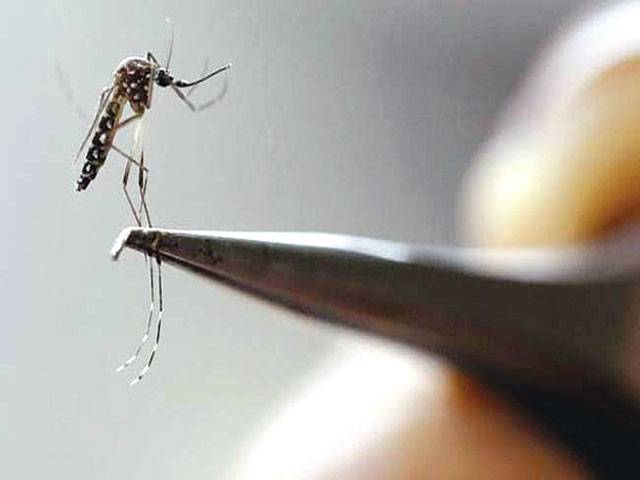Brazil confirms mosquito as Zika vector
RIO DE JANEIRO (AFP): Brazilian scientists said Monday they have found the first hard evidence the Zika virus blamed for causing brain damage in hundreds of babies is carried by the Aedes aegypti mosquito. Despite the fact that world health authorities have said for months that the mosquito species is the main vector for Zika, no Aedes aegypti carrying the virus had previously been found in the Americas. Brazil, the country hardest hit by the Zika outbreak, has focused its efforts to contain the virus on eradicating Aedes aegypti populations, and the scientists behind the study said it was important to confirm the link between the mosquito and the disease.
Loss of Y chromosome linked to Alzheimer’s disease
MIAMI (AFP): About one in five men over age 80 lose the Y chromosome from their blood cells, and this condition has now been linked to an increased risk of Alzheimer’s disease, researchers have said. The condition known a loss of Y, or LOY, is the most common genetic mutation acquired during a man’s lifetime. Previous research has shown LOY can raise the likelihood of cancer and is more frequently found in smokers. Now, researchers say the condition may serve as a predictive biomarker for a wider range of health problems. For the study in the American Journal of Human Genetics - led by Lars Forsberg and Jan Dumanski of Uppsala University in Sweden, along with colleagues Britain, France, the United States and Canada - researchers examined cases of LOY in more than 3,200 men with an average age of 73.
Around 17 percent showed LOY in blood cells.
Those who had been already diagnosed with Alzheimer’s had a higher degree of LOY, they found.
Also, those who had not yet been diagnosed with dementia but had LOY were more likely to develop Alzheimer’s in subsequent years.
“Having loss of Y is not 100 percent predictive that you will have either cancer or Alzheimer’s,” cautioned Forsberg.
Some men with LOY in the study lived with no symptoms well into their 90s. “But in the future, loss of Y in blood cells can become a new biomarker for disease risk and perhaps evaluation can make a difference in detecting and treating problems early.”
According to Chris Lau, professor in the department of medicine at the University of California, San Francisco, the study sheds little light on why Alzheimer’s risk may be elevated in these men.
“Although informative, the study is preliminary in nature and only highlights the fact that the Y chromosome could serve important functions beyond male sex determination and sperm production,” said Lau, who was not involved in the study. “What exactly on the Y chromosome that increases the risk of Alzheimer’s disease is the key issue.”
Since the Y chromosome contains many genes - some unique to men and others shared with women, who do not have a Y chromosome - more research is needed.
“It depends on what is lost to determine what is important for Alzheimer’s disease. Without such information, the loss of Y is just an observation,” Lau said.
Canadian PM Trudeau shows romance is not dead
TOKYO (AFP): Whoever said romance was dead has obviously not met Canadian Prime Minister Justin Trudeau. The 44-year-old pinup premier said Tuesday he would take a day off ahead of G7 talks in Japan to celebrate his wedding anniversary with spouse Sophie Gregoire Trudeau, calling it an essential “work-life balance”. The couple, who arrived in Japan on Monday, are headed to a traditional inn called a ryokan on Wednesday before the two-day meeting of the club of rich nations begins Thursday. The photogenic Trudeau - who has amassed a growing legion of mostly female fans - said the pair would rely on “personal funds” for their 11th wedding celebration. “This is the kind of work-life balance that I’ve often talked about as being essential in order to be able to be in service of the country,” he told reporters in Tokyo.
Earlier Tuesday Trudeau met the Imperial couple and auto industry executives, and was to hold talks with Prime Minister Shinzo Abe in the evening.
Solar Impulse plane postpones Ohio departure
WASHINGTON (AFP): A solar-powered plane set to fly from Ohio to Pennsylvania on Tuesday delayed its departure to inspect possible damage due to a mishap, organizers said. The Solar Impulse 2, set to be piloted by Swiss national Bertrand Piccard, was scheduled to fly out of Dayton International Airport and head to Lehigh Valley International Airport near the city of Allentown at 1000 GMT. However problems arose with the fan needed to keep the giant plane’s mobile hanger inflated, and while rebooting the system, “some parts of the airplane were lightly touched by the deflating hangar fabric,” organizers said in a statement.
The slow-moving, single-seat plane with the wingspan of a Boeing 747, contains 17,000 solar cells that power the aircraft’s propellers and charge batteries. The panels provide the plane’s sole source of energy for the flight.
At first check engineers found no damage. “However this will have to be studied more carefully over the next few days and as such the flight from Dayton to Lehigh Valley has to be postponed,” the statement said.
No rescheduled departure time or date was announced. The Solar Impulse 2 has traversed much of the globe in stages since taking off March 9, 2015 from Abu Dhabi. The project aims to promote renewable energy.
Strongest El Nino in nearly 20 years ends: Australian weather bureau
SYDNEY (Reuters): The strongest El Nino in nearly 20 years, which damaged crop production in Asia and caused food shortages, has ended, the Australian Bureau of Meteorology (BOM) said on Tuesday. Climate indicators associated with El Nino, which emerged in 2015, have now returned to neutral levels, the BOM said. El Nino sees in a warming of sea-surface temperatures in the Pacific which can lead to scorching weather across Asia and east Africa, but heavy rains and floods in South America. The latest El Nino resulted in sea temperatures rising to the highest levels in 19 years, causing drier than average weather which resulted in a fall in production of wheat, palm oil and rice in Asia. The end of El Nino was not unexpected with climate indicators cooling in recent months, but Australia’s BOM is the first major meteorology agency to declare the end of El Nino.
Farmers will now be looking for the development of a La Nina weather pattern, which typically brings wetter weather across the Asian region. The chance of La Nina is at 50 percent, the Australian weather bureau said.
Facebook apologises for banning ‘undesirable’ plus-sized model
SYDNEY (AFP): Facebook has been forced to backtrack after it banned an Australian ad featuring a bikini-clad plus-sized model promoting positive body image, initially saying the photo’s depiction was “undesirable”. The social networking giant blocked the ad for Melbourne’s “Cherchez La Femme: Feminism and Fat” gathering, saying the image violated its advertising guidelines. When organisers questioned the decision, the Facebook Ads Team wrote back saying the ad did not comply with their health and fitness policy because “the image depicts a body or body parts in an undesirable manner”. “Ads like these are not allowed since they make viewers feel bad about themselves,” said the letter to organiser Jessamy Gleeson, who posted a screen-shot of it online.
Gleeson said she was stunned that Facebook “seemingly has no idea that plus-sized, self-describing fat women can feel great about themselves”. She urged followers on the platform to “rage hard at anyone who tries to tell us that some bodies are more ‘desirable’ than others”.
“Facebook has ignored the fact that our event is going to be discussing body positivity (which comes in all shapes and sizes, but in the particular case of our event, fat bodies),” she wrote.
Facebook “has instead come to the conclusion that we’ve set out to make women feel bad about themselves by posting an image of a wonderful plus-sized woman.”
Gleeson said Facebook later apologised for its actions, sending her a note admitting it had incorrectly reviewed the ad.
“Our policies are in place to help protect the community from offensive ads that can damage their experience on our platform,” it said in a screen-shot Gleeson posted on Twitter.
“This is not the case here and I’m sorry for our incorrect review. We evaluate millions of ads per week and there are instances that we incorrectly disapprove an image that does not violate our policies.”











